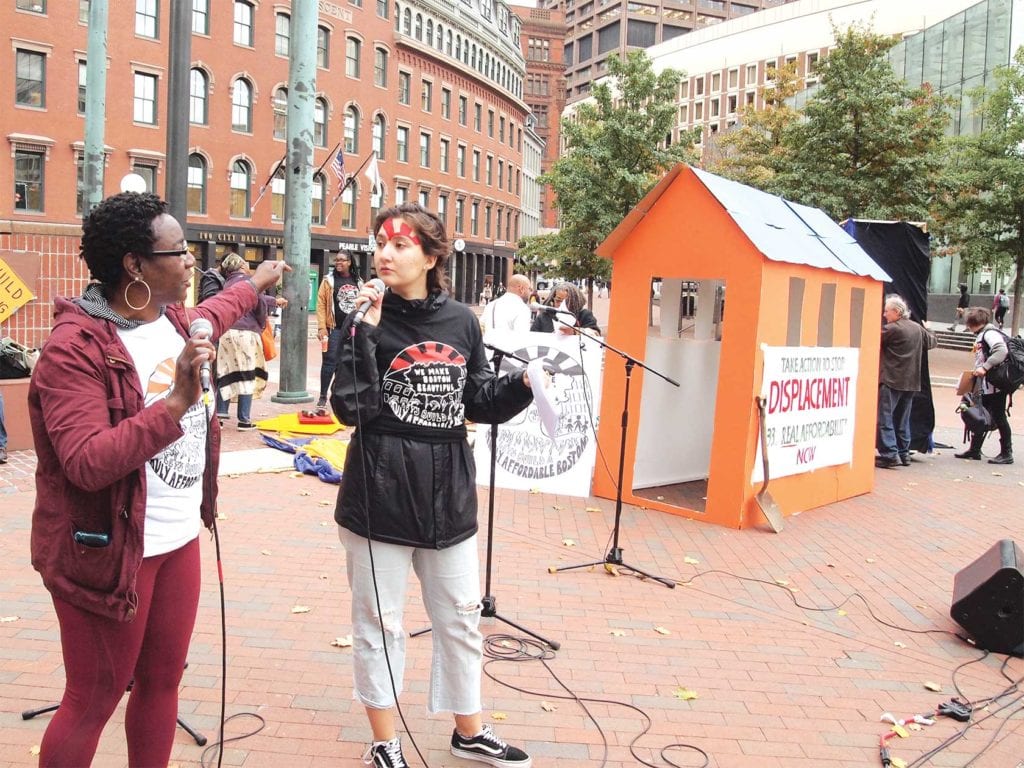Affordable housing advocates call for increase in required percentage of units

While Boston is in the midst of an unprecedented construction boom, with new luxury units rising in every neighborhood, activists say the city is also in the midst of an affordability crisis.
“You have developers who come and tell you they’re going to invest in your neighborhood and make it better,” Markeisha Moore of the group Dorchester Not for Sale told a gathering on City Hall Plaza last week. “But once they build their luxury housing, we can no longer afford to live in our neighborhood.”
Moore and several dozen activists gathered at City Hall Plaza Oct. 16 in an action calling for an increase in the city’s Inclusionary Development Police guidelines, which mandate the creation of affordable units in new residential buildings with 10 or more units. While the current policy calls for 13 percent of new units to be affordable, the activists are demanding that number be increased to 33 percent and that the threshold be lowered from 10 units.
Department of Neighborhood Development Director Sheila Dillon, who serves as the city’s housing chief, said the city is actively reviewing the policy.
“We hope to have recommendations in the very near future,” she told the Banner. “Our goal is to extend resources for affordable housing — however, we don’t want to chill responsible development in Boston.”
The city is in the midst of a push to have 69,000 new housing units built, to help accommodate its growing population without putting further strain on the housing market. Since 2014, 20 percent of new housing constructed in Boston has been built with some degree of affordability restrictions, from as low as 30 percent of the Greater Boston area median income — which is $79,350 for an individual. But many new units designated “affordable” can go to those making more than 100 percent of AMI, as city officials and developers seek to build homes affordable to moderate-income as well as low-income households.
In addition to seeking a 33 percent IDP requirement, the Coalition for a Truly Affordable Boston is seeking an average income restriction of 40 percent AMI for such units. At 40 percent AMI, an individual would have to earn no more than $31,750 to qualify. The group claims that currently, just 9 percent of new units are being built at this level of affordability.
Yet nearly half of Boston residents earn 40 percent of AMI or lower. Coalition members say there is a mismatch between the affordability levels of new units and the city’s current population.
In few Boston neighborhoods is this mismatch more apparent than Chinatown, where residents of new luxury units have average annual incomes in excess of $350,000, while longtime residents have average family incomes of just $14,000.
“In the last decade and a half, Chinatown has been overdeveloped with luxury housing,” said Karen Chen, executive director of the Chinese Progressive Association. “We need a higher percentage of affordable housing.”
The activists who rallied at City Hall Plaza last week erected a mock affordable home next to a cardboard luxury housing tower. Among those who turned out for the rally were city council candidates David Halbert, Julia Mejia and Kenzie Bok.
Moore of Dorchester Not for Sale said the lack of affordable housing is having a real impact on her Dorchester neighbors. With each new development, priced far beyond what she and her neighbors can afford, displacement becomes a more immediate threat as emboldened landlords raise rents in surrounding buildings.
“I know people have to move out, because I can’t afford the new rents,” she said. “Not only are they not bringing affordable housing to our communities, they’re taking affordable housing away from us.”







